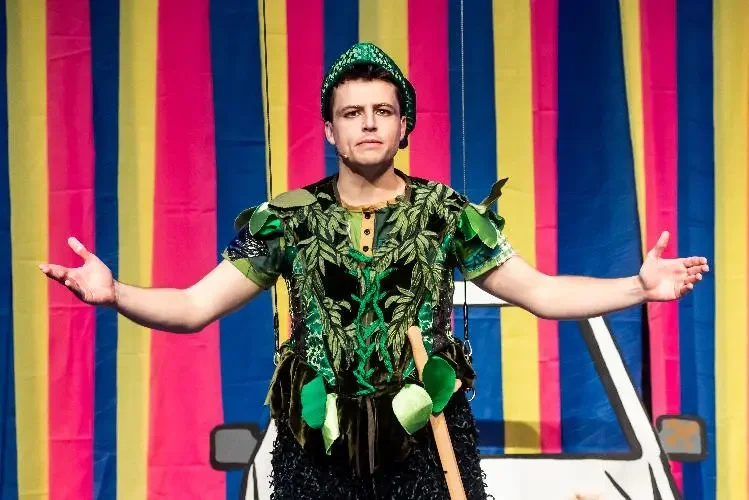The Last Incel at The Pleasance Theatre London Review
The Last Ince production image. Photo by Ben Ayre.
Written by Greta for Theatre & Tonic
Disclaimer: Gifted tickets in exchange for an honest review
Crusher, Ghost, Einstain, and Cuckboy are the aliases chosen by four young men interacting on a Discord server for self-proclaimed incels (involuntary celibates). They have been friends for years, and spend their time together “shitposting”, swapping misogynistic jokes and endlessly insulting each other – all under the cover of friendly banter. When Cuckboy turns up with a hickey, the group's fragile alliance starts to splinter. It is discovered that he has met and slept with a girl named Margaret, who is now at his house after having spent the night. Margaret ends up joining the conversation, wanting to write an article about incels to advance her career as a journalist.
This is the premise for The Last Incel, written and directed by Jamie Sykes, debuting at the Pleasance Theatre after a run at the 2024 Edinburgh Fringe. The constant stream of hate emanating from its chronically online, misguided protagonists – not only towards women, but towards themselves – prods at the edges of what we’re willing to witness, let alone understand.
These are not charismatic villains. They are men-children caught in a cycle of self-pity, fury, and contradiction. Crusher (Jackson Ryan) is the most volatile, carrying the weight of past bullying and annihilating anger; Einstain (Jimmy Cavanagh), the oldest, is celebrating his thirtieth birthday, which in incel culture marks his “ascension” into a “wizard”; Ghost (Goblins Goblins Goblins) is a mischievous, if slightly disquieting, jester figure; Cuckboy (Fiachra Corkery) has a milder, more naïve energy but not without a sense of humour. Together, the four inhabit a world where women are “foids” – a crasis between “female” and “android”, meant to suggest that women aren’t fully human – and where subjects like rape and suicide are dropped alarmingly casually. The misogyny is relentless, but never cartoonish. It’s the language of real people, online and unchecked.
Margaret’s (Justine Stafford) role in the show is much less subversive than it could be. She is portrayed as the voice of reason, and Stafford does a great job of infusing her with grit and wit. However, after joining the group, Margaret’s main aim seems to be convincing the boys that they could have sex if they wanted to, which feels like a spectacular misreading of the room. The piece doesn’t do quite enough to unpack why these men don’t just feel unwanted, but actively abhor the women they say they desire. Margaret’s character could have been used more effectively as a way into this dangerous world of extremes, where women are simultaneously idealised and demonised, without any concern about coherence or even logic.
What the production does well is to physicalise this world. Movement-driven sequences underscored by music give the audience space to breathe, offering moments of fun absurdity that double as visual metaphors for the group’s alienation. The staging is effective: four black rectangular frames are manipulated with dexterity, functioning as windows, prisons, and echo chambers. Most importantly, they give a real sense of how small the world the characters are trapped in is, convinced they have nothing to contribute to the lives of others, and that the outside world has nothing to offer them.
There’s a loneliness pulsing beneath everything. These men are not sympathetic, but they are broken. They long for connection and domesticity, but their understanding of gender has been so thoroughly warped that love becomes indistinguishable from domination. They see women as both the key to salvation and the root of all evil. It’s them or us. The show is at its most incisive when it lingers in this contradiction; there’s real despair here, buried beneath layers of defensive sarcasm and vulnerable arrogance. And yet, there’s also complicity: these are not simply lost boys. They are dangerous. Their anger has curdled into entitlement, their fantasies into threats. They are deliberately choosing not to break the cycle.
A flyer handed out before the performance provides a glossary of incel terminology—helpful, and chilling in its own right. It raises important questions: How widespread is this language? How many people are finding refuge in these toxic communities? And what does it mean to turn this social dysfunction into entertainment? The Last Incel doesn’t always have the answers, but it does succeed as a conversation starter. The cast is strong across the board, portraying people who, at the end of the day, feel like they don’t fit in. Ugly, useless, unwanted: that’s how these incels feel about themselves. It would be so easy to empathise and help if this suffering wasn’t channelled in such a harmful way.
At The Pleasance until 31 May 2025
★★★.5

















